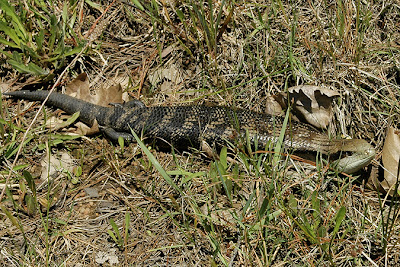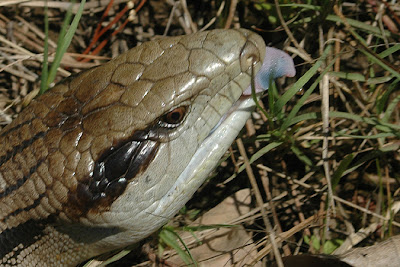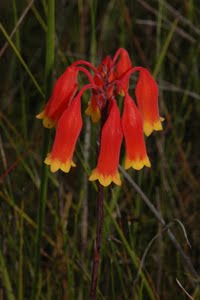 I also took the opportunity to take some photographs, as the Lizard was not in a hurry to go anywhere.
I also took the opportunity to take some photographs, as the Lizard was not in a hurry to go anywhere.Note the backward pointing position of the legs of this lizard (see below for detail). It is the same pose as I observed with a Water Dragon, several weeks ago. It must be a "lizard thing". It seems odd to me, a human, who is more familiar with the posture used by mammals such as cats and dogs. I would expect them to lie with legs poised ready to "push off". But two specimens of very different lizard species, in two weeks, were lying with their legs in just this position. Maybe our local lizards are very "laid back".
 I also wondered if this lizard's tail had re-grown. It seems to be very different in texture from the body of the lizard - much duller. I do not know if this is normal, or not. I have checked the Museum Victoria Bioinformatics site on Victorian Lizards. They had several sub-species of Blue-tongues, but all had more evenly matched tail and body colouring than this specimen. The specimen linked here is closest to the Lizard in these photographs.
I also wondered if this lizard's tail had re-grown. It seems to be very different in texture from the body of the lizard - much duller. I do not know if this is normal, or not. I have checked the Museum Victoria Bioinformatics site on Victorian Lizards. They had several sub-species of Blue-tongues, but all had more evenly matched tail and body colouring than this specimen. The specimen linked here is closest to the Lizard in these photographs.I was expecting that it would hiss at me (as they are supposed to do), but this one did not. I wanted to photograph its tongue (of course). It started to move off through the grass, flicking its tongue very rapidly, but infrequently (i.e., a quick flick of the tongue, every now and then).
 It took me quite some time, and lots of shots to get one fully exposed tongue shot.
It took me quite some time, and lots of shots to get one fully exposed tongue shot. The surprise for me was that the tongue was nearly all pink, with a blue band, or should I say blue dots on either side of the tongue, in a prominent position just behind the tip.
The surprise for me was that the tongue was nearly all pink, with a blue band, or should I say blue dots on either side of the tongue, in a prominent position just behind the tip.By contrast, here is the tongue of another Blue-tongue which I came across down on Tourist Road, Kangaloon, back in February 2007. Its tongue was fully blue, with a strong bright blue colour.
 I wonder if this is an individual difference, age difference (though both specimens were fully grown), or a sexual distinction? I do not know. Any advice from experienced Lizard wranglers would be appreciated.
I wonder if this is an individual difference, age difference (though both specimens were fully grown), or a sexual distinction? I do not know. Any advice from experienced Lizard wranglers would be appreciated.

5 comments:
How fascinating !!
Isn't it great to make these observations of local wildlife. The mostly-pink tongue is odd, and I'll be interested to see if you get a response from someone in the know.
As I have previously mentioned, my resident water dragon also lies in the position with all four limbs facing backwards - "flat out like a lizard in the sun".
:)
Gaye
Hi Gaye
Thanks for the comment (good to see your name pop up again). Hope you are well.
Re the tongue. I think I shall make a point of stopping for more Blue-tongues on roads, to check them out.
Cheers
Denis
I have seen two dead blue-tongue lizards and one dead bearded dragon on our short stretch of road in the last week or so, but unfortunately no live ones to shuffle on to safety. A squashed lizard is always a most disheartening sight.
From my kitchen yesterday, I saw a smallish, slender, light coloured dragon in my garden, but upon investigation I could not locate it. This garden is only very new with small native plants and lots of mulch, so it just goes to show that there are lizards out there looking for a bit of habitat. In a couple of years time, I should have some great lizard habitat :)
Cheers
Gaye
Hi Gaye
I once had the horrid experience of watching a car aim at a Jackie Lizard which "froze" in the middle of the road. It was a high speed hit, and the poor lizard just exploded!
It was a deliberate run-over, as I saw the car aimed at it (in the middle of the road). I make a point of trying to avoid them , or in the case of the slow-moving Blue Tongues, trying to encourage them off the road. Obviously, that is only safe on quiet country roads, you cannot play heroes on highways, and I would not recommend that!
Of course, like with Tortoises, you can not know if they just walk back out into the road, as soon as you have gone. But one has to try!
Denis
Many pet lover like this lizard.
Post a Comment